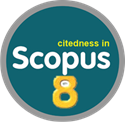Income Smoothing Analysis at Food and Beverages Companies Listed on the Indonesia Stock Exchange
Abstract
The purpose of this study is to examine the effect of Firm Size, company profitability, company operating leverage, and company investment status on income smoothing practices in companies that go public on the Indonesia Stock Exchange. The statistical method used is multiple linear regression with dummy variables. Based on the sampling criteria, the food and beverage companies that went public on the Indonesia Stock Exchange from 2013 to 2017, the samples of this study amounted to eight companies, and these companies have been statistically tested to practice income smoothing. Multiple linear regression analysis with dummy variables in this study was carried out 2 (two) times because, in the first test, the multiple linear regression model with the resulting dummy variables violated the classical assumption, namely autocorrelation. The results of multiple linear regression analysis with the second test dummy variable are only the firm size which affects income smoothing, while the profitability, operating leverage, and investment status has no effect on income smoothing
Downloads
References
AAA, American Accounting Association's Financial Accounting Standards Committee, (2006). Financial Accounting, and Reporting Standards for Private Entities, Accounting Horizon, 20 (2), June, 179-194, retrieved from https://www.fasb.org/jsp/FASB/Document_C/DocumentPage&cid =1176156894785
Akbari, F., Salehi, M. and Bagherpour Vlashani, M.A. (2019), "The relationship between tax avoidance and firm value with income smoothing: A comparison between classical and Bayesian econometric in multilevel models," International Journal of Organizational Analysis, Vol. 27 No. 1, 125-148. https://doi.org/10.1108/IJOA-09-2017-1235
Assih & Gudono, (2000), Hubungan Tindakan Perataan Laba dengan Reaksi Pasar atas Pengumuman Informasi Laba Perusahaan yang Terdaftar Di Bursa Efek Jakarta, Jurnal Riset Akuntansi Indonesia, Vol.3 No. 1, Januari, 35 – 53.
Choi, Frederick .D.S & Meek, Gary .K, (2005), International Accounting Buku 1 edisi 5, Jakarta: Salemba Empat.
Drover, W., Wood, M. S., & Corbett, A. C. (2018). Toward a Cognitive View of Signalling Theory: Individual Attention and Signal Set Interpretation, Journal of Management Studies, 55 (2), 209-231, https://doi.org/10.1111/joms.12282
Indrawan, V., Agoes, S., Pangaribuan, H., & Popoola, O. M. J. (2018). The Impact of Audit Committee, Firm Size, Profitability, and Leverage on Income Smoothing. Indian-Pacific Journal of Accounting and Finance, 2(1), 61-74. Retrieved from http://ipjaf.omjpalpha.com/index.php/ipjaf/article/view/42
Juniarti & Corolina, (2005), Analisa Faktor-Faktor yang Berpengaruh terhadap Perataan Laba (Income Smoothing) pada Perusahaan-Perusahaan Go Public, Jurnal Akuntansi Dan Keuangan, Vol. 7 No. 2, November, 148-162.
Jin, L. S. & Machfoedz, M. (2000), Faktor – Faktor yang Mempengaruhi Praktik Perataan Laba pada Perusahaan yang terdaftar di Bursa Efek Jakarta, Jurnal Riset Akuntansi Indonesia, Vol.1 No. 2, Juli, 177 – 191.
Khafid & Mahfud, (2002), Analisis Income Smoothing (Perataan Laba): Pengaruhnya terhadap Reaksi Pasar dan Risiko Investasi pada Perusahaan Publik di Indonesia, Jurnal Manajemen Akuntansi dan Sistem Informasi, Vol.1, Agustus, 69 – 89.
Megarani, N., Warno, & Fauzi, M. (2019). The effect of tax planning, company value, and Leverage on income smoothing practices in companies listed on Jakarta Islamic Index, Journal of Islamic Accounting and Finance Research, Vol. 1 No. 1, 139-162; DOI: https://dx.doi.org/10.21580/ jiafr.2019.1.1.3733
Mulyani & Meiden, (2003), Perataan Laba: Praktik Perilaku Disfungsional Manajemen, Jurnal Manajemen Keuangan, Vol. 10 No. 3, September, 47 – 63.
Peterson, O. K. & Arun, T.G. (2018). Income smoothing among European systemic and non-systemic banks, The British Accounting Review, 50 (5), September, 539-558
Prihatmoko & Wibowo, (2004), Analisis Perataan Laba (Income Smoothing): Faktor – Faktor yang Mempengaruhi dan Kaitannya dengan Kinerja Saham Perusahaan Publik di Indonesia, Media Riset Akuntansi, Auditing dan Informasi, Vol. 4 No. 3, Desember, 259 – 281.
Purwanti, A., & Utama, I. W. (2018, June 30). Earning Management Analysis before and after Implementation of International Financial Reporting Standards (IFRS): Empirical Study of Automotive and Components Companies Registered on the IDX. Journal of Accounting and Strategic Finance, 1(1), 45-56. https://doi.org/https://doi.org/10.33005/jasf.v1i01.25
Sesilia, D. & Nurkholis, (2001), Analisis Reaksi Pasar terhadap Informasi Perataan Laba: Kasus Praktik Perataan Laba pada Perusahaan yang Terdaftar di Bursa Efek Jakarta, TEMA, Vol. 2 No. 1, Maret.
Salno & Baridwan, (2000), Analisis Perataan Penghasilan (income smoothing): Faktor yang Mempengaruhi dan Kaitannya dengan Kinerja Saham Perusahaan Publik di Indonesia, Jurnal Riset Akuntansi Indonesia, Vol.3 No.1, Januari, 17 – 33.
Venturelli, A., Caputo, F., Leopizzi, R. and Pizzi, S. (2019), "The state of art of corporate social disclosure before the introduction of non-financial reporting directive: a cross country analysis," Social Responsibility Journal, Vol. 15 No. 4, 409-423. https://doi.org/10.1108/SRJ-12-2017-0275
Waluyo, Y., (2007), Industri Manufacture hanya tumbuh 5,83% pada kuartal 1, Bisnis Indonesia, Tahun XXII, no 7336, 22 mei, Hal 1.
Yanti, N. M. Y. W. A. & Dwirandra, A.A.N.B. (2019). The Effect of Profitability in Income Smoothing Practice with Good Corporate Governance and Dividend of Payout Ratio as a Moderation Variable, International Research Journal of Management, IT & Social Sciences, Vol. 6 No. 2, March, 12~21, https://doi.org/10.21744/irjmis.v6n2.601
Yusuf & Soraya, (2004), Faktor – Faktor yang Mempengaruhi Praktik Perataan Laba pada Perusahaan Asing dan Non Asing di Indonesia, Jurnal Akuntansi dan auditing Indonesia, Vol. 8 No.1, Juni, 99 – 125.
Copyright (c) 2019 Arief A Nugroho

This work is licensed under a Creative Commons Attribution 4.0 International License.














